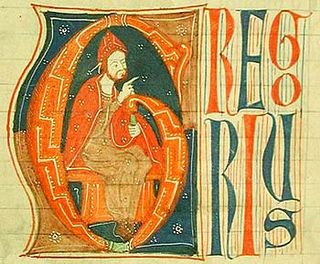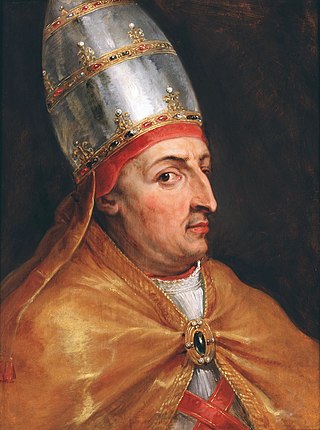![<span class="mw-page-title-main">Knights Templar</span> Catholic military order, [ 1119–1312 ]](https://upload.wikimedia.org/wikipedia/commons/thumb/0/03/Seal_of_Templars.jpg/320px-Seal_of_Templars.jpg)
The Poor Fellow-Soldiers of Christ and of the Temple of Solomon, mainly known as the Knights Templar, was a French military order of the Catholic faith, and one of the wealthiest and most popular military orders in Western Christianity. They were founded c. 1119 to defend pilgrims on their way to Jerusalem, with their headquarters located there on the Temple Mount, and existed for nearly two centuries during the Middle Ages.

Pope Boniface VIII was the head of the Catholic Church and ruler of the Papal States from 24 December 1294 until his death in 1303. The Caetani family was of baronial origin, with connections to the papacy. He succeeded Pope Celestine V, who had abdicated from the papal throne. Boniface spent his early career abroad in diplomatic roles.

Pope Clement V, born Raymond Bertrand de Got, was head of the Catholic Church and ruler of the Papal States from 5 June 1305 to his death, in April 1314. He is remembered for suppressing the order of the Knights Templar and allowing the execution of many of its members. A Frenchman by birth, Clement moved the Papacy from Rome to Avignon, ushering in the period known as the Avignon Papacy.

Pope Gregory IX was head of the Catholic Church and the ruler of the Papal States from 19 March 1227 until his death in 1241. He is known for issuing the Decretales and instituting the Papal Inquisition, in response to the failures of the episcopal inquisitions established during the time of Pope Lucius III, by means of the papal bull Ad abolendam, issued in 1184.

Jacques de Molay, also spelled "Molai", was the 23rd and last grand master of the Knights Templar, leading the order sometime before 20 April 1292 until it was dissolved by order of Pope Clement V in 1312. Though little is known of his actual life and deeds except for his last years as Grand Master, he is one of the best known Templars.
Omne datum optimum was a papal bull issued by Pope Innocent II on 29 March 1139 that endorsed the Order of the Poor Knights of Christ and of the Temple of Solomon, in which the Templar Rule was officially approved, and papal protection given.

The Council of Vienne was the fifteenth ecumenical council of the Catholic Church and met between 1311 and 1312 in Vienne, France. One of its principal acts was to withdraw papal support for the Knights Templar at the instigation of Philip IV of France. The Council, unable to decide on a course of action, tabled the discussion. In March 1312 Philip arrived and pressured the Council and Clement to act. Clement passed papal bulls dissolving the Templar Order, confiscating their lands, and labeling them heretics.

Geoffroi de Charney, also known as Guy d'Auvergne, was preceptor of Normandy for the Knights Templar. In 1307 de Charny was arrested, along with the entire Order of Knights Templar in France, and in 1314 was burned at the stake.

The Military Order of Christ is the former order of Knights Templar as it was reconstituted in Portugal. Before 1910, it was known as the Royal Military Order of Our Lord Jesus Christ, and the Order of the Knights of Our Lord Jesus Christ. It was founded in 1319, with the protection of King Denis of Portugal, after the Templars were abolished on 22 March 1312 by the papal bull, Vox in excelso, issued by Pope Clement V. King Denis refused to pursue and persecute the former knights as had occurred in most of the other sovereign states under the political influence of the Catholic Church.

Dum Diversas is a papal bull issued on 18 June 1452 by Pope Nicholas V. It authorized King Afonso V of Portugal to fight, subjugate, and conquer “those rising against the Catholic faith and struggling to extinguish Christian Religion”— namely, the "Saracens (Muslims) and pagans" in a militarily disputed African territory. The document consigned warring enemies that lost to "perpetual servitude". This and the subsequent bull, issued by Nicholas in 1455, gave the Portuguese what they saw as moral justification to freely acquire slaves along the African coast by force or trade. The edicts are thus seen as having facilitated the Portuguese slave trade from West Africa and as having legitimized the European colonization of the African continent.
Francis of Assisi founded three orders and gave each of them a special rule. Here, only the rule of the first order is discussed, i.e., that of the Order of Friars Minor.

The Chinon Parchment is a historical document discovered in September 2001 by Barbara Frale, an Italian paleographer at the Vatican Apostolic Archive. On the basis of this document she has claimed that, in 1308, Pope Clement V absolved the last Grand Master, Jacques de Molay, and the rest of the leadership of the Knights Templar from charges brought against them by the Medieval Inquisition.
The Poor Fellow-Soldiers of Christ and the Temple of Jerusalem, or Templars, was a military order founded in c. 1120.
In 1128, the cousin of St Bernard of Clairvaux, Hugues de Payens, met King David I in Scotland. The Order established a seat at Balantrodoch, now Temple, Midlothian on the South Esk. In 1189, Alan FitzWalter, the 2nd Lord High Steward of Scotland was a benefactor of the Order.
In supremo apostolatus is a papal brief issued by Pope Gregory XVI regarding the institution of slavery. Issued on December 3, 1839, as a result of a broad consultation among the College of Cardinals, the bull resoundingly denounces both the slave trade and the continuance of the institution of slavery.

Ad providam was the name of a Papal Bull issued by Pope Clement V in 1312. It built on a previous bull, Vox in excelso, which had disbanded the order of the Knights Templar. Ad providam essentially handed over all Templar assets to the Hospitallers, with the exception of some resources which were left to provide pensions to some Templars who had escaped execution and converted to a monastic life.
Sicut dudum was a papal bull promulgated by Pope Eugene IV in Florence on January 13, 1435, which forbade the enslavement of the natives of the Canary Islands who had converted, or were converting to, Christianity. Sicut dudum was meant to reinforce Creator Omnium, issued the previous year, condemning Portuguese slave raids in the Canary Islands.

In 1307, members of the Knights Templar in the Kingdom of France were suddenly charged with heresy and arrested after their leader, Master Jacques de Molay, had recently come to France for meetings with Pope Clement V. Many, including their leader, were burned at the stake while others were sentenced to perpetual imprisonment. The events in France led to a series of trials in other locations, not all of which had the same outcome.
Faciens misericordiam was a papal bull issued by Pope Clement V on August 12, 1308, as part of the trial against the Knights Templar. It called for a new Ecumenical council to be held in 1310, and set out some structure for the collection of depositions from the arrested Templars.
The Council of Troyes was convened by Bernard of Clairvaux on 13 January 1129 in the city of Troyes. The council, largely attended by French clerics, was assembled to hear a petition by Hugues de Payens, head of the Knights Templar. Pope Honorius II did not attend the council, sending the papal legate, Matthew, cardinal-bishop of Albano. The council addressed issues concerning the Templar Order and a dispute between the bishop of Paris and king of France.

![<span class="mw-page-title-main">Knights Templar</span> Catholic military order, [ 1119–1312 ]](https://upload.wikimedia.org/wikipedia/commons/thumb/0/03/Seal_of_Templars.jpg/320px-Seal_of_Templars.jpg)










